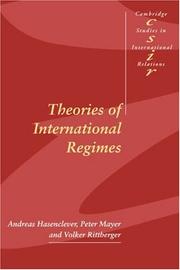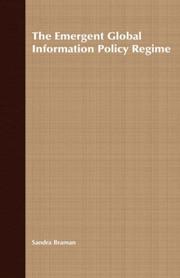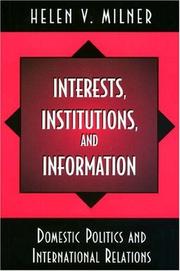| Listing 1 - 7 of 7 |
Sort by
|
Book
ISBN: 9781472427847 Year: 2015 Publisher: Farnham ; Burlington : Ashgate,
Abstract | Keywords | Export | Availability | Bookmark
 Loading...
Loading...Choose an application
- Reference Manager
- EndNote
- RefWorks (Direct export to RefWorks)
Legal polycentricity. --- Pluralisme juridique --- Customary law. --- Droit coutumier --- International regimes --- Régimes internationaux --- Law --- Droit --- Philosophy --- Philosophie --- Droit transnational
Book

ISBN: 9791097578008 Year: 2021 Publisher: Aix-en-Provence : DICE Éditions,
Abstract | Keywords | Export | Availability | Bookmark
 Loading...
Loading...Choose an application
- Reference Manager
- EndNote
- RefWorks (Direct export to RefWorks)
La gouvernance internationale de l’environnement s’est construite par l’émergence progressive d’espaces juridiques et institutionnels relativement autonomes et non hiérarchisés. Des « régimes » spécialisés ont ainsi proliféré au gré de l’identification de nouvelles menaces et de nouveaux problèmes à résoudre. Ils se comptent aujourd’hui par dizaines, si bien que la question de la cohérence de ce paysage fragmenté s’est rapidement posée. La multiplication des régimes entraîne par définition des concurrences, collisions, doubles emplois de plus en plus fréquents. À cela s’est ajoutée la prise de conscience que les enjeux environnementaux sont étroitement interconnectés, comme le montrent les relations entre la lutte contre les changements climatiques d’une part et la protection de la couche d’ozone, la conservation de la biodiversité, la désertification, la protection des forêts ou des océans d’autre part. Dès lors, une gouvernance trop fragmentée ne peut être effective, car elle risque de conduire à défaire d’un côté ce que l’on fait de l’autre. Les États peuvent par ailleurs instrumentaliser la fragmentation, jouant tel régime contre tel autre, en fonction de leurs intérêts nationaux. Après avoir mis en évidence les phénomènes de circulations de normes et d’acteurs entre ces régimes, les auteurs de cet ouvrage pluridisciplinaire réfléchissent aux voies et moyens de les accompagner, voire de les amplifier dans l’objectif de « dé »fragmenter la gouvernance internationale de l’environnement et d’assurer ainsi une meilleure effectivité des politiques conduites. Cette recherche a été financée par l’Agence nationale de la recherche dans le cadre du projet CIRCULEX .
Environmental Studies --- Law --- droit international --- droit international de l’environnement --- circulation --- environnement --- protection --- Nations unies --- expertise --- biodiversité --- climat --- changement climatique --- réseau --- régimes internationaux --- relations internationales --- gouvernance --- coopération --- collaboration

ISBN: 0521591457 0521598494 0511521723 0511836155 9780521591454 9780511521720 9780521598491 Year: 1997 Volume: 55 Publisher: Cambridge: Cambridge university press,
Abstract | Keywords | Export | Availability | Bookmark
 Loading...
Loading...Choose an application
- Reference Manager
- EndNote
- RefWorks (Direct export to RefWorks)
International regimes have been a major focus of research in international relations for over a decade. Three schools of thought have shaped the discussion: realism, which treats power relations as its key variable; neoliberalism, which bases its analysis on constellations of interests; and cognitivism, which emphasizes knowledge dynamics, communication, and identities. Each school articulates distinct views on the origins, robustness, and consequences of international regimes. This book examines each of these contributions to the debate, taking stock of, and seeking to advance, one of the most dynamic research agendas in contemporary international relations. While the differences between realist, neoliberal and cognitivist arguments about regimes are acknowledged and explored, the authors argue that there is substantial scope for progress toward an inter-paradigmatic synthesis.
International relations. Foreign policy --- Political philosophy. Social philosophy --- International law. --- International relations. --- International relations --- International law --- Social Sciences --- Political Science --- Law of nations --- Nations, Law of --- Public international law --- Law --- Coexistence --- Foreign affairs --- Foreign policy --- Foreign relations --- Global governance --- Interdependence of nations --- International affairs --- Peaceful coexistence --- World order --- National security --- Sovereignty --- World politics --- VIE INTERNATIONALE --- THEORIES DES RELATIONS INTERNATIONALES --- Régimes internationaux --- THEORIES ET MODELES
Book
ISBN: 9782020914598 Year: 2007 Publisher: Paris Editions du Seuil
Abstract | Keywords | Export | Availability | Bookmark
 Loading...
Loading...Choose an application
- Reference Manager
- EndNote
- RefWorks (Direct export to RefWorks)
manipulation --- recrutement --- Al-Qaïda --- le Jihad --- action islamique --- Moudjahidines --- la Nation musulmane --- moralité --- le Jihad contre les régimes nationaux --- le Jihad contre les régimes internationaux et mondiaux --- politique --- militarisme --- sécurité --- l'Islam --- psychologie --- guérilla --- la doctrine d'action --- le commandement militaire --- femmes et Jihad --- martyrs --- terrorisme

ISBN: 0321048571 9780321048578 Year: 2001 Publisher: New York: Longman,
Abstract | Keywords | Export | Availability | Bookmark
 Loading...
Loading...Choose an application
- Reference Manager
- EndNote
- RefWorks (Direct export to RefWorks)
A theoretical approach that constructs a way of looking at world politics that helps us understand the relationship among economics, politics, and patterns of institutionalized cooperation, while retaining key realist insights about the roles played by power and interests.
World politics. --- International relations --- Politique mondiale --- Relations internationales --- International economic relations --- Economic policy, Foreign --- Economic relations, Foreign --- Economics, International --- Foreign economic policy --- Foreign economic relations --- Interdependence of nations --- International economic policy --- International economics --- New international economic order --- Economic policy --- Economic sanctions --- Coexistence --- Foreign affairs --- Foreign policy --- Foreign relations --- Global governance --- International affairs --- Peaceful coexistence --- World order --- National security --- Sovereignty --- World politics --- Régimes internationaux --- Theories des relations internationales

ISBN: 1403903697 Year: 2004 Publisher: Palgrave Publishers,
Abstract | Keywords | Export | Availability | Bookmark
 Loading...
Loading...Choose an application
- Reference Manager
- EndNote
- RefWorks (Direct export to RefWorks)
Telecommunication --- -Computer networks --- -Internet --- #SBIB:309H1720 --- #SBIB:35H438 --- #SBIB:043.IOS --- DARPA Internet --- Internet (Computer network) --- Wide area networks (Computer networks) --- World Wide Web --- Communication systems, Computer --- Computer communication systems --- Data networks, Computer --- ECNs (Electronic communication networks) --- Electronic communication networks --- Networks, Computer --- Teleprocessing networks --- Data transmission systems --- Digital communications --- Electronic systems --- Information networks --- Cyberinfrastructure --- Electronic data processing --- Network computers --- Cyberspace --- Electric communication --- Mass communication --- Telecom --- Telecommunication industry --- Telecommunications --- Communication --- Information theory --- Telecommuting --- Law and legislation --- Law and legislation. --- Government policy --- Government policy. --- Informatiekunde, informatie management --- Beleidssectoren: openbare werken, verkeer en telecommunicatie --- Distributed processing --- VIE INTERNATIONALE --- ENJEUX --- SOCIETE DE L'INFORMATION --- REGLES INTERNATIONALES --- REGIMES INTERNATIONAUX

ISBN: 069101177X 0691011761 0691214492 9780691011769 9780691011776 Year: 1997 Publisher: Princeton, N.J.: Princeton university press,
Abstract | Keywords | Export | Availability | Bookmark
 Loading...
Loading...Choose an application
- Reference Manager
- EndNote
- RefWorks (Direct export to RefWorks)
Increasingly scholars of international relations are rallying around the idea that “domestic politics matters.” Few, however, have articulated precisely how or why it matters. In this significant book, Helen Milner lays out the first fully developed theory of domestic politics, showing exactly how domestic politics affects international outcomes. In developing this rational-choice theory, Milner argues that any explanation that treats states as unitary actors is ultimately misleading. She describes all states as polyarchic, where decision-making power is shared between two or more actors (such as a legislature and an executive). Milner constructs a new model based on two-level game theory, reflecting the political activity at both the domestic and international levels. She illustrates this model by taking up the critical question of cooperation among nations.Milner examines the central factors that influence the strategic game of domestic politics. She shows that it is the outcome of this internal game — not fears of other countries’ relative gains or the likelihood of cheating — that ultimately shapes how the international game is played out and therefore the extent of cooperative endeavors. The interaction of the domestic actors’ preferences, given their political institutions and levels of information, defines when international cooperation is possible and what its terms will be. Several test cases examine how this argument explains the phases of a cooperative attempt: the initiation, the negotiations at the international level, and the eventual domestic ratification. The book reaches the surprising conclusion that theorists — neo-Institutionalists and Realists alike — have overestimated the likelihood of cooperation among states.
International relations. Foreign policy --- #SBIB:327.1H10 --- #SBIB:327.7H01 --- #SBIB:AANKOOP --- Internationale betrekkingen: theorieën --- Grondslagen, principes, evolutie internationale gemeenschap --- #A0206PO --- Information policy. --- International relations. --- Nation-state. --- World politics --- Information policy --- International relations --- Nation-state --- Information science --- Information services and state --- Communication policy --- National state --- State, The --- National interest --- Self-determination, National --- Coexistence --- Foreign affairs --- Foreign policy --- Foreign relations --- Global governance --- Interdependence of nations --- International affairs --- Peaceful coexistence --- World order --- National security --- Sovereignty --- Government policy --- INTERNATIONAL RELATIONS. --- CASE STUDIES. --- STATES. --- POLITICAL COOPERATION. --- International co-operation. --- Information. --- States. --- International politics. --- Foreign policy. --- Politics. --- Política interna. --- Política internacional. --- Relações internacionais. --- Rationele keuze. --- Politieke instellingen. --- Binnenlandse politiek. --- Internationale samenwerking. --- Theorie --- Nationalstaat --- Internationale Politik --- Interessenpolitik --- World politics. --- Accords internationaux. --- CED = Communaute europeenne de defense. --- Politique de l'information. --- Politique internationale. --- Relations internationales. --- UE/CE CECA. --- UE/CE Traite de Maastricht. --- Unions economiques et monetaires. --- 89.70 international relations: general. --- 89.71 international cooperation: general. --- Information --- Politique mondiale --- Nation. --- Politique gouvernementale. --- Colonialism --- Global politics --- International politics --- Political history --- Political science --- World history --- Eastern question --- Geopolitics --- International organization --- Belgium. --- Bundesbank. --- Chicago Convention. --- Democrats (US). --- Evans, Peter. --- Frieden, Jeffry. --- German rearmament. --- Jacobson, Harold. --- Keohane, Robert. --- Keynes Plan. --- Laver, Michael. --- Lijphart, Arendt. --- Milner, Helen. --- Obstfeld, Maurice. --- Phillips curve. --- Putnam, Robert. --- Rogowski, Ronald. --- Schelling conjecture. --- Truman Administration. --- absolute gains. --- amendment power. --- balance of payments. --- capital mobility. --- cartel. --- domestic politics. --- hierarchy. --- independents. --- interest groups. --- legislature. --- parliamentary systems. --- ratification. --- side payments. --- two-level games. --- World politics - 1989 --- -Information policy --- VIE INTERNATIONALE --- POLITIQUES PUBLIQUES --- REGLES INTERNATIONALES --- POLITIQUE ECONOMIQUE EXTERIEURE --- ORGANISATIONS INTERGOUVERNEMENTALES --- REGIMES INTERNATIONAUX --- Interessenvermittlung --- Lobbyismus --- Interessenverband --- Internationale Beziehungen --- Politische Beziehungen --- Zwischenstaatliche Beziehungen --- Weltpolitik --- Außenpolitik --- Internationales politisches System --- Nationalstaaten --- Staat --- Nationale Einheit --- Praxis
| Listing 1 - 7 of 7 |
Sort by
|

 Search
Search Feedback
Feedback About UniCat
About UniCat  Help
Help News
News